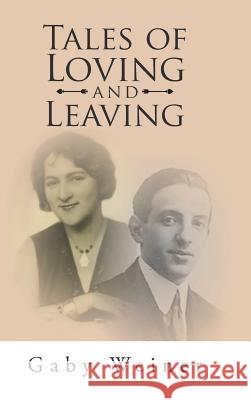Tales of Loving and Leaving » książka
Tales of Loving and Leaving
ISBN-13: 9781524635091 / Angielski / Twarda / 2016 / 210 str.
Tales of Loving and Leaving
ISBN-13: 9781524635091 / Angielski / Twarda / 2016 / 210 str.
(netto: 133,25 VAT: 5%)
Najniższa cena z 30 dni: 138,00
ok. 16-18 dni roboczych.
Darmowa dostawa!
The stories of so-called ordinary families and their place in history are important. Though they're not the stuff of kings and queens or governments or wars, they shed light on how political movements and decisions affect ordinary individuals and how those individuals react to those decisions. In Tales of Loving and Leaving, author Gaby Weiner tells the story of three of her family members: her maternal grandmother, Amalia Moszkowicz Dinger; her mother, Steffi Dinger; and her father, Uszer Frocht. Weiner shares how these people's lives were profoundly affected by the great movements and "isms" of the twentieth century that included not only Nazism, but also the Russian Revolution, the rise and fall of Communism, and the displacement and migration of more than 60,000,000 people following the Second World War. The stories, told in chronological slices, tell about ordinary people who were rendered extraordinary by the period through which they lived. The narratives also focus on the treatment and experiences of Jewish migrants before, during, and after the war in different countries and the impact of these countries' politics on them. Weiner illustrates the effects of separation and trauma and how human beings, when confronted with horror, respond, get on with life, go on to make different futures, and seek to be ordinary again. Tales of Loving and Leaving shows how, following the impact of the Nazi-led genocide, myths were created, secrets were perpetuated, lies were told, shelter was found, futures were shaped, and hope was rekindled.
The stories of so-called ordinary families and their place in history are important. Though they’re not the stuff of kings and queens or governments or wars, they shed light on how political movements and decisions affect ordinary individuals and how those individuals react to those decisions. In Tales of Loving and Leaving, author Gaby Weiner tells the story of three of her family members: her maternal grandmother, Amalia Moszkowicz Dinger; her mother, Steffi Dinger; and her father, Uszer Frocht. Weiner shares how these people’s lives were profoundly affected by the great movements and “isms” of the twentieth century that included not only Nazism, but also the Russian Revolution, the rise and fall of Communism, and the displacement and migration of more than 60,000,000 people following the Second World War. The stories, told in chronological slices, tell about ordinary people who were rendered extraordinary by the period through which they lived. The narratives also focus on the treatment and experiences of Jewish migrants before, during, and after the war in different countries and the impact of these countries’ politics on them. Weiner illustrates the effects of separation and trauma and how human beings, when confronted with horror, respond, get on with life, go on to make different futures, and seek to be ordinary again. Tales of Loving and Leaving shows how, following the impact of the Nazi-led genocide, myths were created, secrets were perpetuated, lies were told, shelter was found, futures were shaped, and hope was rekindled.











